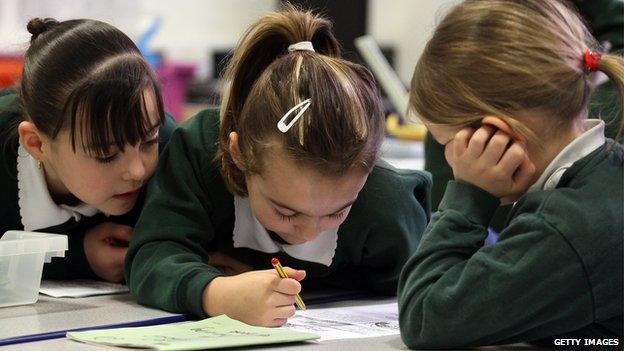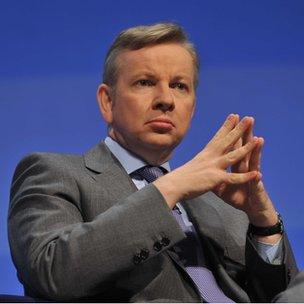Cultural literacy: Michael Gove's school of hard facts
- Published

The theories of ED Hirsch are beginning to influence schools in England. But what does he believe?
In his review of the national curriculum, the Education Secretary Michael Gove has said schools should emphasise the learning of key facts, arming children with essential knowledge to aid their learning - but where has he got this idea from?
BBC Radio 4's Analysis explores the roots of "cultural literacy" and how it is gaining traction in England's schools.
The new intake at Pimlico Academy in London is learning a new kind of lesson. It is all based on a curriculum of hard facts, rather than of skills.
"We want children to be critical thinkers, we want them to be literate, we want them to be numerate [but] what we're doing is thinking how we achieve those ends," says Annaliese Briggs, the woman appointed to run the academy's primary school, due to open next year.
While she does not yet have a teaching qualification, we might be well advised to listen to what she has to say - because according to education secretary Michael Gove, this is the future.
"The curriculum at the moment in primary schools is often referred to as a skills-based curriculum - but I think it's much better to refer to it as a content-lite curriculum," says Briggs.
"We are developing a curriculum that specifies the knowledge that we think children need to know to develop these skills."
This idea, which has really grabbed Michael Gove and other Tories, has its origins in the USA - specifically with an 84-year-old former English literature professor, E.D. Hirsch.
Hirsch has two big ideas: First, that we all need something he calls "cultural literacy" - certain facts, ideas, literary works that he says people need to know in order to operate effectively as citizens of the country in which they live.
And second, that children need to learn these facts in a highly organised, structured way - a sort of "back to basics" education.
Cultural have-nots
The story of cultural literacy started around 20 years ago when Hirsch was working as a college lecturer in Richmond, Virginia - close to where General Robert Lee surrendered to Ulysses S. Grant during the American Civil War.
.jpg)
E.D. Hirch's ideas have been gaining traction with Conservative ministers and schools alike
Hirsch was struck by something about his students - particularly those who came from poorer backgrounds.
"The critical reason that I got into education reform was the strange inability of some community college students - most of them black - to be able to read simple passages about the American Civil War," Hirsch explains.
"The black students could do very well when the topics were about 'Why I like my room mate' and 'Why I don't like traffic on Route 29,' and so on, but they did very badly when it came to 'Lee surrendered to Grant at Appomattox Court House' - which was shaking to me because it took place in Richmond."
"It wasn't that they lacked reading ability. It wasn't even that their vocabularies were excessively small - it was just basic factual information they lacked, which would enable them to understand what they read."
What Hirsch had hit upon was a notion which is now pretty much universally accepted: While some people grow up in homes where all sorts of cultural knowledge is common currency - history, art, literature - others do not.
When those who lack that cultural knowledge find themselves in the midst of a conversation about the American Civil War, or Rodin's sculptures, they feel lost.
Hirsch set about defining the most important background knowledge needed so that the cultural "have-nots" could become "haves". His subsequent book Cultural Literacy became a US best-seller.
The debate about what American children need to know - in order for social justice to be achieved - has been filtering across the Atlantic for a couple of decades, but is now starting to gain some real traction.
A series of books based on Hirsch's thinking are now being published by Civitas, a right-leaning think tank.
But Daisy Christodoulou, managing director of the Curriculum Centre, which is working to promote these ideas in schools across England, says these are not necessarily right-wing concepts.
"I think that if you look back through the historical contours of this debate, that generally it's the left who realise that knowledge is power - that equal access and entitlement to knowledge is so important."
Working class ideal
She is working with the Pimlico Academy primary school and talks with great passion about the way in which, for her, Hirsch's work fits with a proud working class tradition.
"Plenty of trade unionists and plenty of the early members of the Labour movement recognised this too," she says.
Christodoulou references Robert Tressell's The Ragged Trousered Philanthropists - an inspirational early labour movement text - and says it has some parallels with Hirsch's ideas.
"I think you see very clearly the similar ideas that Hirsch is talking about, that there is a common heritage of knowledge and every pupil, every citizen in this country, has a right to share in that knowledge."
Daisy Christodoulou's father was an immigrant from Cyprus: "He remembers going to school in the East End and very often not knowing what they were talking about," she says.
"He didn't want me to have that experience at school. He wanted me to be able to go into school and to know what was going on."
Christodoulou certainly embodies Hirsch's idea that factual knowledge is the route to educational success.
In 2007 she was on the winning team on University Challenge - in fact she answered so many questions over the series that there were headlines in the papers asking "Is Daisy Britain's Brightest Student?"
But not everyone agrees with her that Hirsch is the product of a long, proud, left-wing tradition. In fact, according to Hirsch himself, people on the left started to attack his ideas almost as soon as he had articulated them.
In reality, modern-day followers of Hirsch are much more likely to be found on the right of the political spectrum than on the left.
Among them is Conservative MP Nick Gibb, who was, until the recent reshuffle, schools minister in England. He sees Hirsch as a kind of antidote to the kind of left-wing romanticism he believes has really got a grip on the national curriculum.
"If you just look at, for example, the history curriculum, it's all about sorts of skills... essentially constructing historical narratives, explanations," he says.
"I've seen a history lesson where they had a portrait of Henry VII on the interactive white board and they had to intuit from that piece of evidence things about Henry VII.
"Children were coming up with things like 'Henry VII must have been rich' and 'he was full of himself' and I don't think that's a very good use of time in a tight timetable at school. They really ought to be learning the actual knowledge - the story of the history."
Mr Gibb agrees with Hirsch that all children should have the opportunity to learn the same set of core facts about their society.
"The essence of what Hirsch is talking about is: It's not just any knowledge, it's only that knowledge which constitutes the shared intellectual currency of the society."
More knowledge, less individuality
Curriculum expert Prof Andrew Pollard disagrees. He does not accept the former minister's view that lessons in English schools are "content-lite".
"I'm sure you can find examples of that sort, just as you can find examples of cramming of knowledge," he says.
"It's a very wide-ranging system and I think there's no doubt that more emphasis on knowledge and facts and so forth is not necessarily a bad idea - but I don't think caricatures of practice help us greatly."
The debate about Hirsch is a polarised one, but Sir Michael Barber, formerly Tony Blair's chief adviser on policy implementation and now chief education adviser at the educational publisher Pearson, says there is a third way.
"The road to hell in education is paved with false dichotomies. If you think of knowledge as two aspects - knowing content, knowing information, and then also knowing how to do something.
"Take Pythagoras' Theorem. Is that knowledge or skills? It's not really useful unless you can apply Pythagoras' Theorem when you need to with a mathematical problem - and that's knowing how.
"Knowing what and knowing how - knowledge and skills - go together."
But Education Secretary Michael Gove is certainly keen to inject more of Hirsch into English schools. He told MPs earlier this year that far from seeing these ideas as old-fashioned, he expected schools to embrace them.

Education Secretary Michael Gove has commended the use of a "knowledge-based curriculum"
Mr Gove says he does not want to force schools to adopt Hirsch's ideas - but some members of the expert panel set up to provide advice on his curriculum review think that is just what he is doing.
Prof Andrew Pollard was one of the panel's four members. It came up with a perfectly sensible conclusion: education is the product of interaction between knowledge and individual development.
But Mr Gove and Mr Gibb did not entirely agree with that. They want more of the knowledge and less of the individual development. And they want it laid out as Hirsch recommends - in specific, year-by-year detail.
And, according to Prof Pollard, the notion that teachers should have freedom to decide when children should learn what, and how, was rejected.
"I think it's curious that despite this focus on knowledge, ministers so show such a cavalier disregard for research evidence from the UK and across the world," he says.
"This research is largely consistent in saying that the key factor in high quality education, in raising standards, is the input of teachers and their capacity to deploy their expertise."
Sir Michael Barber has just published a paper on schools around the world. He found that the people who think the curriculum is the answer, are asking the wrong question.
"In Britain and the US there's a tendency to assume that a child is either born so-called 'clever' or not, and then the school system just discovers whether that's true or not, " he says - noting that it is different in Asia, home to some of the highest education standards in the world.
"In Pacific-Asia they assume that every child can learn this content through hard work - with parental support and good teaching.
"We see very passionate, committed teachers and parents who believe that their children can succeed regardless of their background.
"That means that they get more children making more progress and they have less of an equity gap than we have in Britain or has traditionally been the case in the United States."
However, Sir Michael does not completely dismiss Hirsch.
"Cultural literacy is important too and if you don't know those key facts in the society you live in, you're permanently disadvantaged. I think that is a key fact."
Listen to the full report on BBC Radio 4's Analysis. Listen again on the Radio 4 website or the Analysis podcast.
- Published23 October 2012
- Published17 October 2012
- Published3 April 2012